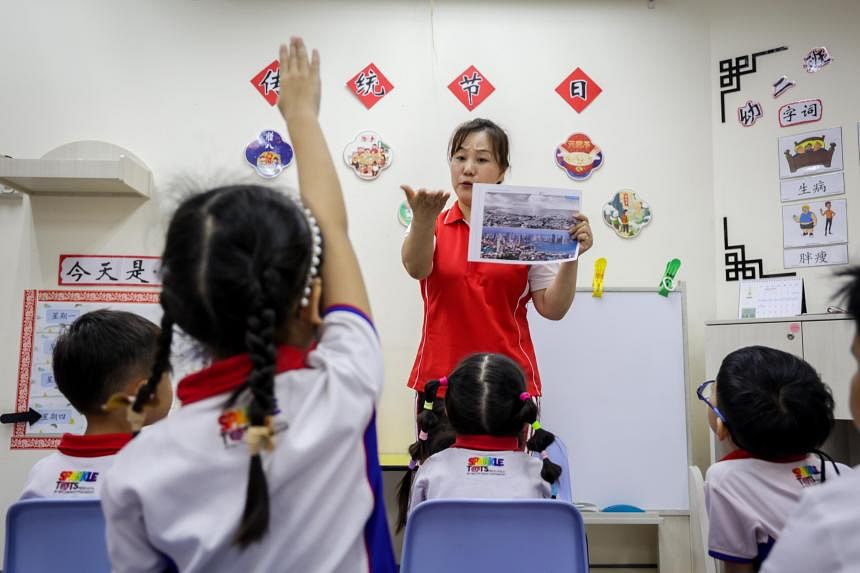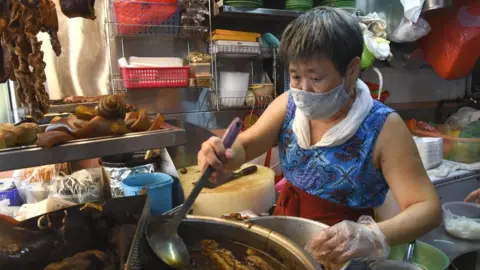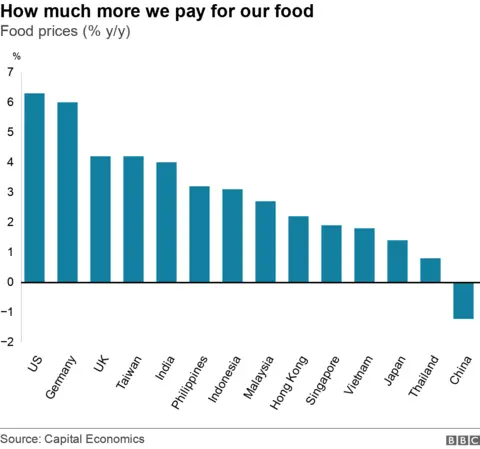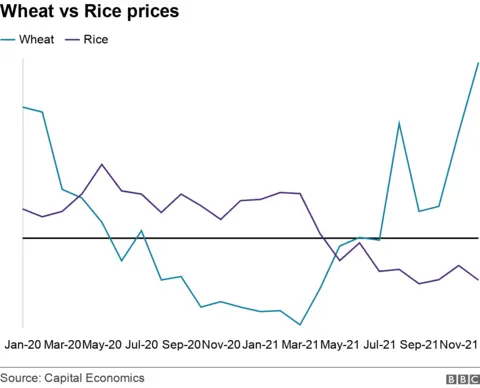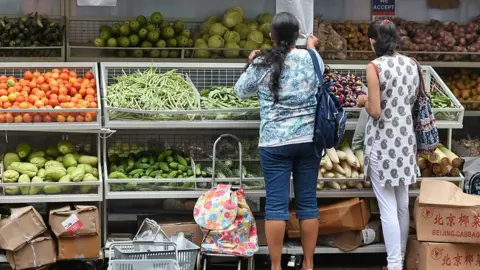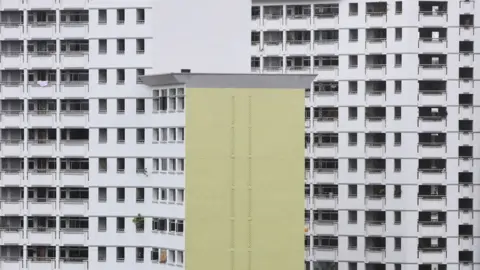Singapore inequality: How a tote bag sparked a debate about class
31 January 2023
By Nicholas Yong,BBC News
Share
Supplied
The post that sparked a social media storm
Earlier this month, 17-year-old Zoe Gabriel posted on TikTok about her "first luxury bag": a tote bag from retailer Charles & Keith, purchased by her father for the princely sum of S$79.90 ($60; £50).
The post and those that followed have now drawn tens of millions of views and snowballed into a wider debate about class and social inequality in Singapore, a wealthy country whose government is becoming wary of increasing signs of stratification.
Charles & Keith is a Singaporean mid-range brand dubbed "Little CK" (Little Calvin Klein) in China and Taiwan, and is also popular in countries such as India and Thailand.
But in status-conscious Singapore, whose glitzy malls are packed with designer outlets, it does not count as luxury and the initial post, which has now had more than 20 million views, quickly drew contemptuous comments.
"Calling this luxury is the same as calling a fast food restaurant fine dining," said one snarky TikTokker.
Zoe, the eldest of four children, responded with an emotional video referencing a commenter who had said with a laughing emoji, "Who's gonna tell her?"
In the post, seen more than six million times, she said: "Growing up, I did not have a lot. My family didn't have a lot. To you, an $80 bag may not be a luxury, but to me and my family, it is a lot."
This time the reaction was overwhelmingly positive. Zoe's TikTok following has since jumped by more than 200,000, while Charles & Keith and other brands also plied her with gifts.
Zoe, who moved to Singapore with her family from the Philippines in 2010, told the BBC that while she was heartened by the online support, she felt "overwhelmed and sad" by comments that criticised her father, a mechanical engineer (she has since deleted them).
"I also didn't understand why it was so hard for people to understand why [the bag] meant so much to me, in a sentimental and monetary sense," she said.
The debate has reached the upper echelons of Singapore's political life, with Lawrence Wong, the current deputy PM who is due to become the country's next leader, alluding to the episode in a speech urging Singaporeans not to be overly preoccupied with status and social prestige.
Class matters
As a multiracial, multicultural country that has experienced racial riots, Singapore has historically been most concerned with preserving racial and religious harmony. There are stiff penalties, including jail time, for those who wound racial or religious feelings.
But in 2018, OnePeople.sg - an agency promoting racial harmony - commissioned research that identified the class divide as potentially the country's most divisive fault line. The year before, the Institute of Policy Studies, a prominent local think tank, came to the same conclusion.
The city-state, which has some of the highest-paid ministers in the world, is a place of sometimes extreme contrasts, with glittering condominiums and towering facades just a stone's throw from one-room rental apartments inhabited by elderly and blue-collar families. Despite the image projected by the film Crazy Rich Asians, not everyone can afford a Charles & Keith bag.
Getty Images
Most Singaporeans live in publicly built housing
Last year, a study by the National University of Singapore showed that the median income of graduates in their 20s and 30s was S$4,200 a month, more than double the salary of those with secondary or lower education. By contrast, a cleaner is projected to earn between S$1,570 and S$2,210 this year.
Soaring inflation has also come to the fore, exacerbated by the war in Ukraine and the increasing costs of manpower and ingredients. A recent 1% hike in the controversial goods and services tax, with another to come next year, has also driven up the cost of everyday staples such as eggs and fresh vegetables.
Skyrocketing property prices - even public housing flats in desirable neighbourhoods can fetch up to a million dollars on the resale market - have added to concerns about social inequality.
Last year Singapore was ranked the most expensive city in the world, together with New York, by the Economist Intelligence Unit.
A middle-class country?
Ironically, despite the presence of the "crazy rich" and the less fortunate, Singaporeans tend to believe that their country is largely middle-class, noted prominent lawyer Adrian Tan, 55. This is down to the fact that almost 80% of the population lives in high quality public housing and has easy access to good broadband, rigorous education and the like.
Mr Tan has written extensively on social media about his own humble background - he lived in a "tiny flat" in one of the city-state's earliest public housing projects, and grew up with neither a telephone nor a TV.
"Singaporeans are attuned to minute differences in material positions [and] judge one another on the level of wealth accumulation," he told the BBC.
He said the mocking commenters simply felt Zoe was "ignorant" of what some Singaporeans feel is a "widespread consensus" on what luxury items are.
"Those who can afford consumer goods such as a Charles & Keith bag don't see themselves as particularly privileged or wealthy," he added.
Alluding to the infamous "5 Cs" tagline of the 1990s - when Singaporeans aspired to having cash, country club, car, credit card and condominium - Nydia Ngiow of the strategic policy advisory firm Bower Group Asia said it would be hard to shift such attitudes "particularly for younger generations who have only experienced a prosperous Singapore in recent decades".
She said the idea of social equality had increasing resonance among younger people and this had driven positive comments on Zoe's posts after the initial social media storm.
Getty Images
Singapore has plenty of designer shopping
Mr Tan also pointed out that while Singaporeans are "acutely sensitive" to the plight of poorer people, they are less interested in structural reform and concepts like a minimum wage.
"Singaporeans are, by and large, satisfied with the society they've built. The attitude here is 'if it ain't broke, don't reform it'," he said.
Despite this, officials are keen to intervene.
In 2018, Prime Minister Lee Hsien Loong warned that elite schools - those open only to students with the best grades - were in danger of becoming "self-perpetuating closed circles", while Education Minister Ong Ye Kung said social mobility had fallen.
"For families who cannot move up despite the stronger and better support that is available now, we find their circumstances more dire and challenging than poor families of the past," Mr Ong said.
The government already spends more than a third of the annual state budget on education, healthcare and housing. During the pandemic, it also pumped almost S$59bn into support measures for workers, businesses and households.
Recent corrective measures include disbursing hundreds of dollars in vouchers to Singaporean households, to be used for groceries and daily expenses, to offset the GST tax hike.
Mr Wong, who is also Finance Minister, has indicated that the wealthy can expect to pay more taxes going forward, and has floated the idea of a wealth tax.
Zoe meanwhile remains sanguine about the social media storm and its aftermath.
"I love living in Singapore, and I don't think it has changed my perspective in a bad way," she said. "It reminded me that there's always going to be somebody who doesn't agree with you, and we can't please everybody."

